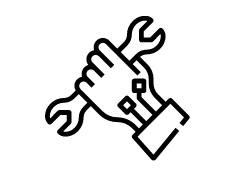
How To Properly Maintain A Boat Year Round
Learn how to maintain a ski, pontoon, deck, or fishing boat properly year round. Boats and other marine craft face many potential maintenance issues throughout the year. Just because your boat is in dry dock, or you are still using it daily, doesn’t mean there isn’t maintenance to be done. With knowledge of proper in-season and off-season boat care techniques, you can ensure that your boat not only lasts for years to come but also runs like a top when you go to use it.
The process of boat care and regular maintenance is more than simply pulling your boat from the water and draining engine fluids and bilge. The preventative boat maintenance techniques listed below will help keep your boat running strong throughout the year, and even after it has been sitting for an extended period of time.
Boats that the following maintenance can apply to.
- Ski Boats
- Tri / Pontoon Boats
- Deck Boats
- House Boats
- Cabin Cruisers
- Cigarette Boats
- Fishing Boats
- Duck Hunting Boats
- And any other boat with a hull, motor, and batteries.
Maintain A Boat battery.
The single most annoying thing that any boat owner can experience is getting to a boat launch and your motor not wanting to crank because your battery is on the fritz. You don’t want to be “that guy” holding everyone else up, while you and your buddies try to figure out why your boat won’t start and use an entire can of ether trying to get your boat running (Been there and done that). Learning how to properly maintain a boat battery is more important and should be done more often than your truck’s battery you used to get to the launch.
Battery Cable Maintenance
Batteries must be correctly mounted for them to give a safe and effective performance. Aside from the obvious fact that loose batteries put more stress on your battery cables, loose wires are also a HUGE safety, and fire hazard. Shifting battery cables can contact metal parts of the boat and cause a short circuit that starts a fire.
How To Properly Charge Your Boat Battery
The best thing that you can do for your batteries is to keep them properly charged. All batteries will self-discharge if left to sit, but don’t overcharge your boat battery. Like any battery, if over-charged, it will go bad and the longevity of it will be cut short. The best thing you can do is buy a charger that STOPS charging it when the battery is fully charged.
Maintain A Boats Electrical Lines
Like batteries, wires can corrode and cause major if not life-threatening issues if not maintained properly. Make sure that none of your lines are corroded and that any exposed wires are out of waters reach. Fiberglass boats will burn up in the blink of an eye, and thousands of boats have been lost to electrical fires. A prime example is the most recent dive boat fire off the California Coast.
It is detrimental that all exposed wires be covered and that the electronics on your boat are wired correctly so they do not short out.
Check Your Boat Bilge Pumps Often
Checking your boats bilge pumps religiously is a must for any boat owner. The rest of your boat’s maintenance is irrelevant if your boat happens to sink at your boat slip. To be on the safe side, servicing your bilge pumps once a month will prevent failure, and help keep your boat afloat. A bilges mechanical and electrical systems are prone to failure. Corrosion in bilge pump wires is a common issue boater deal with because you guessed it. . . water. Aside from electronic bilge issues, debris and other objects from your boat can clog the bilges internal workings and in turn cause it to fail when needed.
Make sure to periodically check and clear your bilge pump lines as needed. Depending on your use for your boat, you may need to check it more often than some. Water should ALWAYS flow fluently through your bilge lines. It is always a good idea to test your bilge pump before you go out.
Cover The Exterior Of Your Boat
Mother nature has its ways of destroying marine craft. Whether it be wind, hail or rain (funny, it’s a boat that sits in the water), you should always cover your boat. If your boat stays docked all year, a boat dock cover will help prevent debris and grime from accumulating over time. Even if you have a “covered slip”, a boat cover or dock cover can help to prevent debris from old rotten wood flaking off onto your boat, or even better, protect from falling wood and debris from a rotten or older dock. It will also make your job easier when it comes time to clean the interior of your boat before your next time on the water.
Use Marine Grade Cleaning Products To Protect Your Boat
You spent a lot of money to get your boat, and it’s nice until it’s not. Don’t neglect cleaning and taking care of your boats hull and seats. Use marine-grade cleaning products to help protect your boat. Different types of seats need different types of cleaning products to protect them from dirt, grime and most of all the suns UV exposure. Keep your seats from cracking with the right leather conditioners made for boats.
Change the boat engine oil regularly.
Whether you’re using it daily, or a few times a year. It is extremely important to regularly change the engine oil in your boat or other watercraft. Bad oil setting in your engine for any extended period of time can cause serious issues when you go to crank it up again.
There’s more information on how to change your boat engine oil in the article on winterizing your boat below.
Winterize Your Boat
A lot of things can happen to your boat during the offseason. This obviously applies to spring and summer boaters. Boats run by duck hunters, winter boaters and fisherman should know how to properly winterize a boat, but since it is being run constantly, there may not be a need.
Depending on where you live, you may need to figure out how to properly winterize the boat to protect it from these common cold weather threats.
Tips For Winterizing Your Boat
1. Make sure your jack stands are level and on solid ground. If jack stands are not set up properly, they can end up shifting out from under the hull and dumping your boat in the middle of the winter.
2. Cover your boat! Covering your boat in the winter benefits it by protecting gelcoat, preventing snow and ice accumulation, and keeping water from pooling on the decks.
3. Don’t leave any heaters on. You don’t want to cause a fire!
4. If you’re going to leave your boat in the water, you need to make sure that snow and ice do not accumulate in the cockpit over the winter.
Indoor storage is best for winterizing boats, but typically cost more monthly for monthly storage fees etc. If you looking for a SOLID boat cover that will withstand what mother nature throws at it, check out our boat dock covers that are proven to protect your boat.
Good Boat Maintenance
If you learn how to maintain a boat properly, your hull will last forever, and your motor should crank and run like a top anytime you go to start it. Most people lack the motivation to continually maintain and keep on top of issues regarding their boats. If this hasn’t been part of your yearly routine, there’s no better time to start than now with winter coming.
Get a head start on winterizing your boat so that come lake season, you and your family are ready to hit the water!

Limited Lifetime Warranty

Made In USA

Installation Or DIY

Superior Materials
REVIEWS
SEE WHY PEOPLE LOVE
#SLIPSKI
